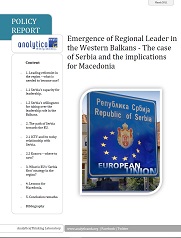Emergence of Regional Leader in the Western Balkans - The case of Serbia and the implications for Macedonia
Emergence of Regional Leader in the Western Balkans - The case of Serbia and the implications for Macedonia
Author(s): Sonja Zuber
Subject(s): International Law, Governance, International relations/trade, EU-Approach / EU-Accession / EU-Development, EU-Legislation, Geopolitics
Published by: Аналитика Тинк-тенк Организација
Keywords: Western Balkans; regional leader towards European Union; EU integration process; negotiation; Serbia; North Macedonia; geopolitics; International Court of Justice; Kosovo’s independence; international law;
Summary/Abstract: Serbia has always been an interesting case for analysis when dealing with the Western Balkans’ political, economical and cultural relations. Serbia’s central location in the Balkan Peninsula and its big territory (slightly bigger than Bulgaria), give her a significant importance in the geo-politics of Europe and wider. In addition the key corridor 10, which is the bloodstream of the region, passes throughout the whole country. These geo-political characteristics however, are not the only reason that makes Serbia important for the region and the EU itself. Serbia has a so called “institutional memory”, relatively long tradition of established bureaucracy reflected on functional administration and institutions which directly effects EU integration processes and makes cooperation feasible (as it is a highly bureaucratic process in nutshell). Comparatively Serbia’s statehood dates back much earlier than most of the other Western Balkan (WB) countries.
Series: ANALYTICA - Policy Reports
- Page Count: 16
- Publication Year: 2011
- Language: English
- Content File-PDF

